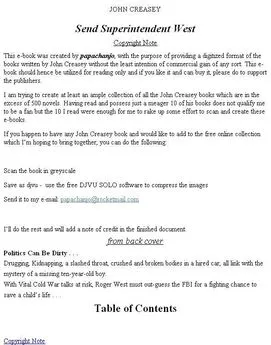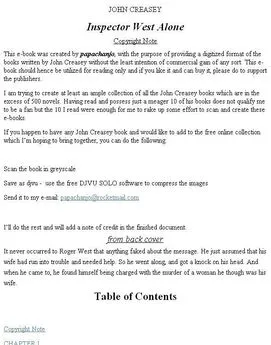John Creasey - Send Superintendent West
- Название:Send Superintendent West
- Автор:
- Жанр:
- Издательство:неизвестно
- Год:неизвестен
- ISBN:нет данных
- Рейтинг:
- Избранное:Добавить в избранное
-
Отзывы:
-
Ваша оценка:
John Creasey - Send Superintendent West краткое содержание
Send Superintendent West - читать онлайн бесплатно полную версию (весь текст целиком)
Интервал:
Закладка:
He was dragged up a flight of stairs.
They stopped.
He was pulled upright and then thrust forward, staggered helplessly and crashed down. A sound behind him might have been the slamming of a door; another, the turning of a key. He didn’t try to get up at once, but lay there, mouth wide open, gasping for breath. He still couldn’t see, but there were curious shapes twisting and turning in front of his eyes, like the filament of giant electric lamps. At last he sat up; then stood up. The whirling shapes were smaller, less clearly defined, and he could tell the difference between light and darkness now. It was only a question of waiting. His legs felt stiff and painful, and he could feel the bruises where the powerful fingers had gripped his arms. He moved his hands vaguely. Finding only space, he took a few steps forward and moved them again. This time he touched something. A chair. He moved round it cautiously until he could safely sit down.
What would happen next?
Not light and darkness, for there was light in the room; he was recovering, and could see the wall — pictures on the wall, too. Silly pictures — that elephant, for instance. Who on earth would have a picture of an elephant, trunk curled upwards, as decoration? There were several other blurred shapes near it He stood up slowly and concentrated on them, and they began to make sense — an inverted kind of sense. A giraffe, long neck stretched full length; a snarling lion, a tiger, a bear. The Zoo. This was crazy. Who would decorate walls with —
His thoughts seemed to be cut off.
After a moment of numbed horror he accepted the answer to that last question. Parents would decorate walls with animals — for their children. In their childhood Richard and Martin had woven wonderful stories about the animal faces stuck on the walls of their nursery.
These murals ran along the full length of one wall, and he looked round, turned his head — and then stopped short Tension as great as that he had felt beneath the flashing light came back to him.
In the corner behind him was a bed, and on the bed lay a child.
• • •
The child was pale, about Ricky Shawn’s size, with the same thin features. Was it Ricky Shawn? Who else would it be? The child was thinner than Roger remembered him from the photograph, but his eyes were enormous — rounded, terrified as he lay on the pillows. His arms were over the sheets; there was a steel bracelet round each wrist, and the bracelets were fastened by slender steel chains to the bed, so that the boy couldn’t move. He couldn’t speak, either. Adhesive plaster smothered his lips, a pink smear where the mouth ought to be. His nostrils were moving spasmodically as he breathed, his chest was heaving. The terror in his eyes was an ugly thing.
Roger moistened his lips, and tried to speak. He only croaked. He smiled, and knew that he must look grotesque, was frightening the boy still more. How could he offer reassurance? He took a step forward, and the child cringed back. He stopped and touched the chair, then slowly turned it to face the boy, and sat down. He swallowed the lump in his throat, waited until his mouth was moist, and then spoke.
“I — won’t — hurt — you.”
The terror didn’t fade, and there was no change in the boy’s expression. Roger tried again, with the same words. It was no good. He doubted if the child heard him. He stood up, slowly, and repeated:
“I won’t hurt you.”
He went towards the small bed, and again the boy cringed back, but this time Roger went on until he was at the side of the bed. He smiled down, and this time his lips didn’t curl into grotesque lines; this time it was a more natural smile. He had to reassure the child; it wasn’t a question of trying, he had to do it. He put his right hand out and touched the boy’s forehead, smoothed it gently and smiled again. He didn’t think it did any good. The small forehead was cold as marble. Cold — and the room was warm.
I’ll try to help you,” Roger said. He couldn’t make a promise, one never made a promise to a child unless it could be kept I’ll try. Do you feel all right?”
The rounded eyes peered into his, still with no easing of the terror, no relaxing. The little arms, bare nearly to the elbow, were pale but taut Roger moved away, pulled the chair up and sat near the bed. There was no indication that the boy heard him, nothing had yet penetrated that cruel shell of terror.
“Listen to me,” Roger said slowly. “Nod if you can hear me. Nod your head if you can hear me.” He paused. “Can you hear me?”
He waited, feeling a surge of helplessness, and then won a slight reward. The boy nodded slowly, twice. Was it imagination, or was there at last a slight easing of the intensity of his fear?
“That’s good,” said Roger. “Nod if you understand me. I am going to try to get you away from here. Do you understand?”
A pause; then another nod.
“And a lot of people are trying to find you. Your mother and father — a lot of other people, too. Do you understand?”
A nod.
Roger said: Have they hurt you, Ricky?” He wanted to pull off the plaster, but before he started, he had to win the boy’s confidence. Even if he started, would he be allowed to finish? “Have they hurt you, Ricky?”
The door opened, the boy’s gaze switched and the terror flared up again. Roger turned as a man said:
“We haven’t hurt him, yet. We haven’t hurt you , yet. Get up and come with me.”
16
QUESTIONS
HE was a short man with broad shoulders, stocky, alert.
His dark hair was brushed off a forehead which hadn’t a wrinkle. His features were small in a big face — his mouth a puppet’s mouth. He wore only trousers and a shirt, and a tie that was pulled away from his neck, and looked fresh and cool. He didn’t show a gun, and the bigger man behind him in the doorway had empty hands.
The stocky man gripped Roger’s arm, waking the bruises to protest, but he didn’t resist — resistance wouldn’t get him anywhere. Not yet He didn’t look round at the child again. He was pushed to the right at the passage, and still in that powerful grip, hustled to the end of it and then through an open door. The passage wasn’t long, and there was ample room for two men to walk side by side.
Beyond the door a flight of wooden steps led downwards. He went down between the two men, turned right into a kitchen which glistened with white tiles and steel fittings, crossed a small room which had an arched doorway but no door, and then found himself in a long, narrow room, subdued lights, easy chairs, and all the furniture of a pleasant lounge, making it look homely and comfortable.
Sitting in an armchair at the far end of the room, legs stretched out, head resting against the back of the chair, was Gissing. And Gissing smiled at him.
There wasn’t any possibility of a mistake.
Here were the dark eyes, with almost hairless brows, and short, stunted lashes, the long, pale face and narrow, pointed chin, the small hooked nose and the thin gash of a mouth. Gissing was relaxed, smiling as if amused. This time he wore cotton gloves, and not adhesive plaster; he wasn’t going to leave fingerprints anywhere.
“Come and sit down, West,” he said.
The big man pushed Roger forward. He steadied himself against the side of a table, watching Gissing. An easy chair with its back to a draped window stood across the room, and he went across to it and sat down. He didn’t look round, but was sure that the men who had brought him from the boy’s room were still in the doorway. Then he forgot them. Gissing’s voice, so much more pleasant than his looks, was calm and amiable — he seemed genial, as if he were a world removed from the blinding lights and the captive child.
“Bring Mr West a drink, Mac.”
Mac for McMahon, who had taken a boy aboard an aircraft?
The stocky man with the big face and small features came forward; Roger hadn’t visualized him at a cocktail cabinet.
“Whisky and soda,” Gissing said. “You haven’t been here long enough to acquire new tastes, have you?”
“I’ve exactly the same likes and dislikes as always,” Roger said. He hoped his smile wasn’t too sickly.
Gissing chuckled.
“And you don’t like me! There’s no need to get hot about it, but you’re not a man to blow your top, are you? The drink is all right this time, although the one at the Milton Hotel wasn’t.”
So he hadn’t been brought here to be offered the poisoned cup. Gissing wanted to talk, to question him. Roger took the whisky and soda, and sipped. He could have emptied the glass in a gulp, and called for more, but resisted the impulse. He put it on a small table by his side, where a box of cigarettes and a lighter stood. He took a cigarette, lit it, and looked at Gissing.
“Where do you think this is going to get you?”
“Just where I want to go,” said Gissing, and laughed comfortably. The contrast between his manner and his looks was still startling. Had Roger been blindfolded, he would have got the impression of a mild-mannered, friendly man who amused himself with nothing more deadly than playing hit songs from popular and rather dated musicals. “The boy hasn’t been hurt, West He was chained to the bed and plastered just to impress you. Not with what we’ve done, but with what we can do. I don’t want to hurt the kid. He ’ s done nothing.”
“So you’re a humanitarian, too,” Roger said. “It’ll take years to repair the damage you’ve done to his mind.”
“Quite the psychiatrist,” Gissing said sarcastically. “I didn’t bring you here to talk about him, though. Why did you come to New York, West?”
“On an assignment.”
“To identify me?”
“I can’t stop you guessing.”
“No,” Gissing said softly. “You can’t stop me from guessing. You can’t prevent yourself from talking, either.” He shifted his position a little, but still relaxed, legs stretched out and hands resting on the arms of his chair. He wasn’t drinking or smoking. “You can have it the easy way, or you can have it the hard way. You’re on special assignment, to find me. You’re working with Marino, which makes you a man of importance. You’re going to tell me how much Marino knows. Nothing will help you, if you don’t. I want to know how long Marino has been watching me, who else he knows in my setup, everything. Take it the easy way, West. If you talk, you won’t get hurt I’m leaving soon, you won’t know where to look for me — no one will. You won’t be able to do me any harm, and I’ve nothing against you. I don’t want to hurt you any more than I want to hurt the boy. Don’t be difficult, just tell me everything you know about the Shawn case — just how much Marino has told you.”
Roger didn’t answer.
Gissing said without raising his voice: “I’m not a patient man, and it won’t trouble me if they hurt you. It wouldn’t worry me to hear you screaming, and if I saw your fingers bent and broken and your mouth a mash of blood where they’d pulled your teeth with pinchers, it wouldn’t lose me any sleep. It would be a waste of a good policeman, and I don’t like waste if it can be avoided Just talk.” He smiled, sat up, and raised a hand.
The stocky man in the doorway moved forward. Roger felt tension rising, the stealthy movement did more to work upon his fears than loud-voiced threats. He didn’t move or look round, but expected a blow; instead, Mac came in front of him with another whisky and soda. He put it down next to Roger’s half-empty glass and went away.
“You can have as much as you like of whatever you like,” Gissing said. “You’ll be comfortable and well fed. We’ll have to hold you for a few weeks, but that’s all. McMahon and Jaybird will take care of you.”
Читать дальшеИнтервал:
Закладка:










